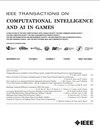Product Propagation: A Backup Rule Better Than Minimaxing?
Q2 Computer Science
IEEE Transactions on Computational Intelligence and AI in Games
Pub Date : 2017-06-01
DOI:10.1109/TCIAIG.2015.2508966
引用次数: 3
Abstract
There is a gap between theory and practice regarding the assessment of minimaxing versus product propagation. The use of minimaxing in real programs for certain two-player games like chess is more or less ubiquitous, due to the substantial search space reductions enabled by several pruning algorithms. In stark contrast, some theoretical work supported the view that product propagation could be a viable alternative, or even superior on theoretical grounds. In fact, these rules have different conceptual problems. While minimaxing treats heuristic values as true values, product propagation interprets them as independent probabilities. So, which is the better rule for backing up heuristic values in game trees, and under which circumstances? We present a systematic analysis and results of simulation studies that compare these backup rules in synthetic trees with properties found in certain real game trees, for a variety of situations with characteristic properties. Our results show yet unobserved complementary strengths in their respective capabilities, depending on the size of node score changes (“quiet” versus “nonquiet” positions), and on the degree of advantage of any player over the opponent. In particular, exhaustive analyses for shallow depths show that product propagation can indeed be better than minimaxing when both approaches search to the same depth, especially for making decisions from a huge amount of alternatives, where deep searches are still prohibitive. However, our results also provide some justification for the more or less ubiquitous use of minimaxing in chess programs, where deep searches prevail and the pruning algorithms available for minimaxing make the difference.产品传播:比最小化更好的备份规则?
关于最小化与产品传播的评估,理论与实践之间存在差距。在某些双人游戏(如国际象棋)的真实程序中,由于几种修剪算法能够大幅减少搜索空间,因此最小化的使用或多或少是普遍存在的。与此形成鲜明对比的是,一些理论工作支持这样一种观点,即产品传播可能是一种可行的替代方案,甚至在理论上更为优越。事实上,这些规则有不同的概念问题。当最小化将启发式值视为真值时,产品传播将其解释为独立的概率。那么,在游戏树中备份启发式值的最佳规则是什么?在什么情况下?我们提出了一个系统的分析和模拟研究结果,将合成树中的这些备份规则与某些真实游戏树中的属性进行了比较,适用于具有特征属性的各种情况。我们的研究结果显示,根据节点得分变化的大小(“安静”与“非安静”位置),以及任何球员相对于对手的优势程度,他们各自的能力存在尚未观察到的互补优势。特别是,对浅层深度的详尽分析表明,当两种方法都搜索到相同的深度时,产品传播确实比最小化要好,尤其是在从大量备选方案中做出决策时,深度搜索仍然令人望而却步。然而,我们的结果也为国际象棋程序中或多或少普遍使用的最小化提供了一些理由,在国际象棋程序,深度搜索占主导地位,而可用于最小化的修剪算法起到了作用。
本文章由计算机程序翻译,如有差异,请以英文原文为准。
求助全文
约1分钟内获得全文
求助全文
来源期刊

IEEE Transactions on Computational Intelligence and AI in Games
COMPUTER SCIENCE, ARTIFICIAL INTELLIGENCE-COMPUTER SCIENCE, SOFTWARE ENGINEERING
CiteScore
4.60
自引率
0.00%
发文量
0
审稿时长
>12 weeks
期刊介绍:
Cessation. The IEEE Transactions on Computational Intelligence and AI in Games (T-CIAIG) publishes archival journal quality original papers in computational intelligence and related areas in artificial intelligence applied to games, including but not limited to videogames, mathematical games, human–computer interactions in games, and games involving physical objects. Emphasis is placed on the use of these methods to improve performance in and understanding of the dynamics of games, as well as gaining insight into the properties of the methods as applied to games. It also includes using games as a platform for building intelligent embedded agents for the real world. Papers connecting games to all areas of computational intelligence and traditional AI are considered.
 求助内容:
求助内容: 应助结果提醒方式:
应助结果提醒方式:


